Table of Contents
Introduction
Psyllium husk or isabgol husk is a natural polymer.1,2 It consists of the epidermal and adjacent collapsed layers removed from the seeds of the plant Plantago ovata Forsk. (P. ispaghula Roxb.). It is rich in fibre and mucilage. Mucilage is a colourless gelling agent capable of expanding in volume as it absorbs water up to 40 times its weight.1 Dietary fibre obtained from psyllium husk may be used in processed foods, as an ingredient of foods, and as pharmacological supplements.2
Originated from Western Asia, isabgol is an annual herb. Indian Muslims introduced its medicinal properties from seeds collected firstly from some wild species.3 India is presently the major producer and exporter of isabgul husk in the world.4
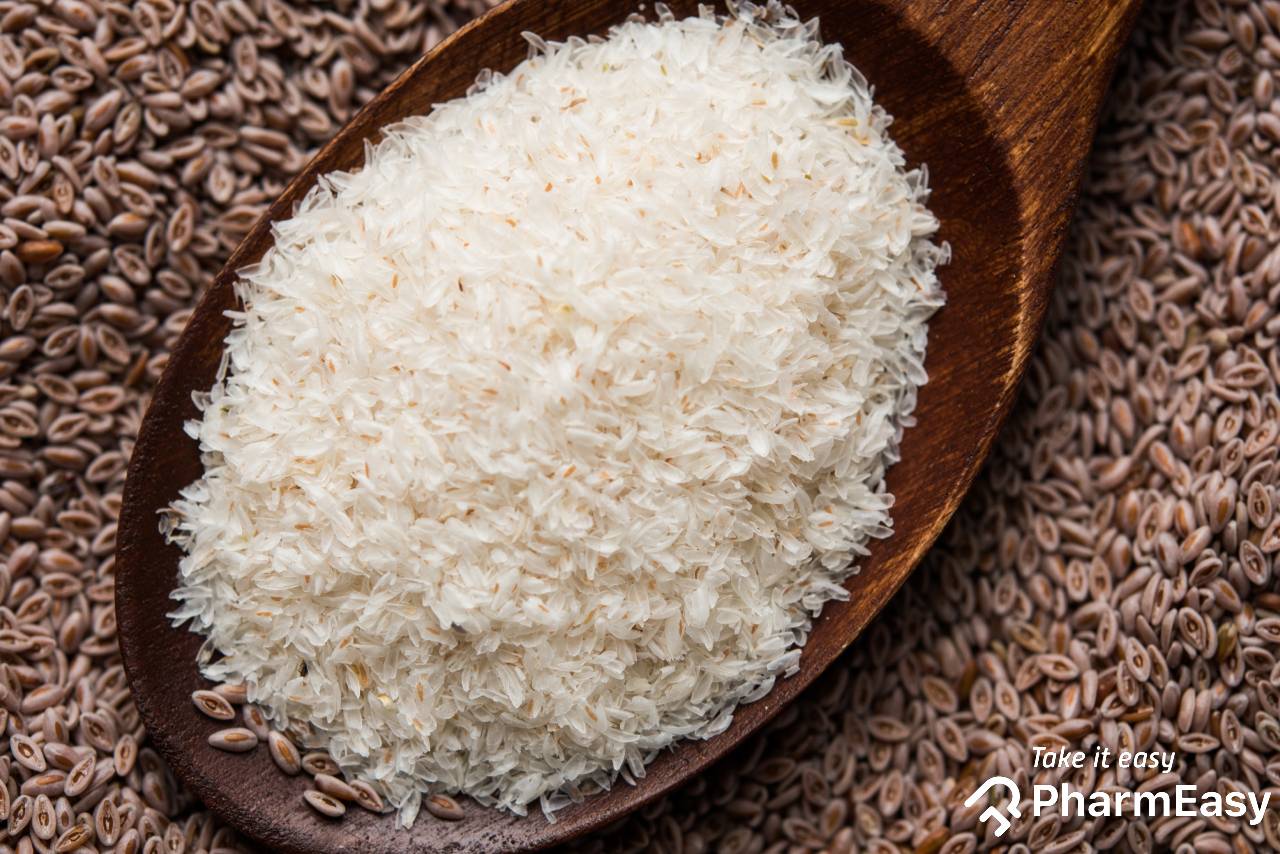
Nutritional Value of Isabgol:
The nutrients present in psyllium husk are as follows:2
- Protein: 0.94 %
- Albumin: 35.8 %
- Globulin: 23.9 %
- Prolamin: 11.7 %
- Total carbohydrates: 84.98 %
Therapeutic Uses of Isabgol:
Researchers from the past decade have shown interest in this naturally occurring swellable biomaterial herb. It has been traditionally used as medicine and is now being utilised in the pharmaceutical industry due to its cholesterol-lowering properties. It also reduces the risk of cardiovascular system diseases. It is used as a bulk-forming, laxative drug, which is non-irritant, demulcent, and cervical dilator.1 It is mainly used in the following conditions:
- Habitual constipation
- Conditions in which it is desirable to have easy defaecation with soft stools, for example, in case of haemorrhoids, anal fissures and difficult excretion after anal or rectal surgery
- Like irritable bowel syndrome and hypercholesterolemia, where patients need to include high dietary fibre daily in diet.5
Dr. Siddharth Gupta, B.A.M.S, M.D (Ayu)Including psyllium in your diet may help regulate your blood sugar levels and improve your overall metabolic health. Psyllium has the ability to enrich certain foods like breakfast cereals, pasta, bread, and some snacks, which can be beneficial for individuals with lipid and carbohydrate metabolism disorders, especially obese adolescents and children.
Benefits of Isabgol:
Isabgol has several advantages for maintaining a healthy life. It is safe and effective for some conditions if taken in a recommended dose.1
1. Benefits of Isabgol for Gastrointestinal Issues & Bowel Diseases:
- Benefits of Isabgol for Managing Constipation:
- Isabgol contributes to the ease of passage of the stools as it adds unfermented gel, which functions as an emollient and lubricant agent.
- Studies and clinical trials have shown that it significantly increased moisture in stools and both dry and wet stool weight in patients with gastrointestinal disease.
- Due to these properties, isabgol is used to manage constipation.1
- Benefits of Isabgol for Diarrhoea:
Studies have shown that isabgol also helps slow down the colon transit and gastrointestinal emptying time; this property is beneficial to people suffering from diarrhoea or faecal incontinence from liquid stools.1
- Benefits of Isabgol for Dealing with Bowel Diseases:
- Supplementing isabgol may help in the management of inflammatory bowel disease, irritable bowel diseases and ulcerative colitis due to its anti-constipation activity.
- Anaerobic fermentation of isabgol fibre in the intestines results in a large production of metabolites, which have antioxidant and anti-inflammatory properties.1
2 Benefits of Isabgol in Managing Colorectal Cancer:
It restricts butyric acid’s antineoplastic activity. Thus, it’s considered beneficial in preventing colorectal cancer.5
3 Benefits of Isabgol for Reducing Cholesterol:
Isabgol fibres (soluble and insoluble) have significance in reducing total low-density lipoprotein and serum cholesterol. Thus, it helps reduce the risk of heart diseases.5
4 Benefits of Isabgol in Managing Haemorrhoids:
- Supplementing isabgol in the diet is helpful in managing haemorrhoids.1
- Since isabgol helps in dealing with both constipation and loose stools, it would also help in managing haemorrhoids.
- In a comparative study, people treated with a placebo of B vitamins had no major difference, and those consuming isabgol had a reduction of bleeding.5
5 Benefits of Isabgol for Type II Diabetes:
Studies on a population with type II diabetes have shown that isabgol husk effectively improved glycaemic and lipid control after meals. 4,5
Also Read: Anjeer – Uses, Benefits, Nutritional Value & Precautions
How to Use Isabgol?
- Studies show that a daily dose of isabgol husk in moderation is very well accepted by the body.
- Isabgol husk is consumed extensively both as a food ingredient in processed foods and in pharmacological supplements.2
Seek advice from your Ayurvedic physician on dosage as per your health condition.4
Also Read: Shilajit – Uses, Benefits, Side Effects & Precautions
Incorporating psyllium into your diet may be beneficial as psyllium husk might be a natural prebiotic. Psyllium husk contains about 15% fermentable fibre, which can support the growth of beneficial bacteria in your gut.
Dr. Rajeev Singh, BAMS
Side Effects of Isabgol:
Side effects observed with isabgol consumption are as follows:
- Few minor unpleasant responses were reported by the studies. Minimum or irrelevant changes in the behaviour were observed.4
- If consumed in the absence of sufficient fluid, it swells up later and may block the throat or oesophagus.5
- In more complex situations, it may cause intestinal obstruction if we fail to maintain a recommended amount of fluid intake.5
- High fibre diet may increase insulin sensitivity.3
Also Read: Toor Dal – Uses, Benefits, Nutritional Value & Side Effects
Precautions to Take With Isabgol:
Keep the following points in mind:
- Isabgol should be taken with an adequate amount of water or some other fluid.
- One must not consume isabgol if they have trouble swallowing or any throat problems.
- You must seek immediate medical attention if, after consuming isabgol, you experience chest pain, breathing issues, difficulty in gulping, congestion, or vomiting.
- Prescribed drugs are advised to be taken separately from isabgol to reduce the interaction possibilities.
- Consuming isabgol husk in the long term can reduce the absorption of vitamin B12, zinc, iron, magnesium and copper. It may also affect calcium absorption.
- It may reduce dietary carbohydrate absorption.
- It is recommended to take drugs at separate administration times (preferably, one hour before) from isabgol husk as there may be possible interactions.5
Also Read: Ragi – Uses, Nutritional Value & Benefits
Interactions With Other Drugs:
- Some drugs may show reduced absorption if taken with isabgol husk or isabgol-containing products as they may tend to slow down gastric emptying time.5
- The levels of drugs given to reduce the risk of heart diseases may also be affected. Thus, it should be taken under medical supervision.5
- Insulin doses must be reduced when insulin-dependent diabetics consume isabgol husk with meals.5
- Medical supervision is needed to adjust the dose of thyroid hormones when taking isabgol husk parallelly.5
- Isabgol should be consumed under medical supervision with medicinal products that inhibit peristaltic movements (muscle contractions that move food through the digestive tract).5
Frequently Asked Questions (FAQs)
Yes, many researchers have investigated the fantastic health benefits of isabgol husk, particularly in weight loss and controlling obesity in children and adults.4
Yes, some studies have shown that taking isabgol husk for weight loss may lead to menstrual disturbances like prolongation of the cycle by 7-10 days and irregular menstrual cycles.6
No, you should avoid consuming isabgol while fasting due to potential reductions in blood sugar levels caused by isabgol.2,5
Yes, isabgol should be taken with a sufficient amount of water or any other fluid like milk.5
Yes, isabgol helps in relieving inflammation, as it has anti-inflammatory properties.7
No, there are no reported benefits of isabgol husk in skin treatment.
Also Read: Sesame Seeds – Uses, Benefits, Side Effects & Precautions
References:
- Purohit P, Rathore HS. Isabgol: a herbal remedy. World J Pharm Res. 2019 Mar;8(7):579-85. Available from: https://www.researchgate.net/profile/Vipin-Kumar-57/publication/38111508_Isabgol_Husk_A_Herbal_Remedy_for_Human_Health/links/02e7e519cfb0038464000000/Isabgol-Husk-A-Herbal-Remedy-for-Human-Health.pdf
- Verma A, Mogra R. Psyllium (Plantago ovata) husk: a wonder food for good health. Int. J. Sci. Res. 2015 Sep;4(9):1581-5. Available from: https://www.ijsr.net/archive/v4i9/SUB158459.pdf
- Qaisrani TB, Butt MS, Hussain S, Ibrahim M. Characterization and utilization of Psyllium husk for the preparation of dietetic cookies. Int J Mod Agric. 2014 Sep;3(3):81-91. Available from: (PDF) CHARACTERIZATION AND UTILIZATION OF PSYLLIUM HUSK FOR THE PREPARATION OF DIETETIC COOKIES (researchgate.net)
- Kumar D, Pandey J, Kumar P, Raj V. Psyllium mucilage and its use in pharmaceutical field: an overview. Curr Synthetic Sys Biol. 2017;5(1):134. Available from: (PDF) Psyllium Mucilage and Its Use in Pharmaceutical Field: An Overview (researchgate.net)
- Sharma VK, Bhattacharya A. Isabgol husk: a herbal remedy for human health. J Pharm Res. 2009 Jan;2:296-301. Available from: (PDF) Isabgol Husk: A Herbal Remedy for Human Health (researchgate.net)
- Tandon VR, Kaur D, Khajuria V. Menstrual disturbance with herbal anti-obesity preparation. J Postgrad Med. 2006 Oct;52(4):326. Available from: https://go.gale.com/ps/i.do?id=GALE%7CA154671827&sid=googleScholar&v=2.1&it=r&linkaccess=abs&issn=00223859&p=AONE&sw=w&userGroupName=anon%7E64271648
- Hashem MA, Abd-Allah NA, Mahmoud EA, Amer SA, Alkafafy M. A preliminary study on the effect of Psyllium husk ethanolic extract on hyperlipidemia, hyperglycemia, and oxidative stress induced by Triton X-100 in ection in rats. Biology. 2021 Apr;10(4):335. Available from: https://www.mdpi.com/2079-7737/10/4/335
Read more about: Health Benefits of Amla
Disclaimer: The information provided here is for educational/awareness purposes only and is not intended to be a substitute for medical treatment by a healthcare professional and should not be relied upon to diagnose or treat any medical condition. The reader should consult a registered medical practitioner to determine the appropriateness of the information and before consuming any medication. PharmEasy does not provide any guarantee or warranty (express or implied) regarding the accuracy, adequacy, completeness, legality, reliability or usefulness of the information; and disclaims any liability arising thereof.
Links and product recommendations in the information provided here are advertisements of third-party products available on the website. PharmEasy does not make any representation on the accuracy or suitability of such products/services. Advertisements do not influence the editorial decisions or content. The information in this blog is subject to change without notice. The authors and administrators reserve the right to modify, add, or remove content without notification. It is your responsibility to review this disclaimer regularly for any changes.



 By
By 




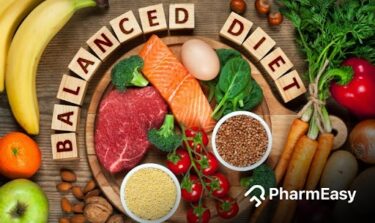
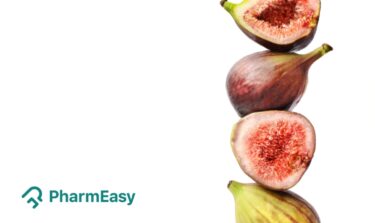
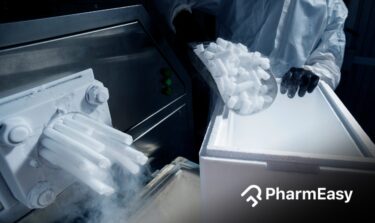
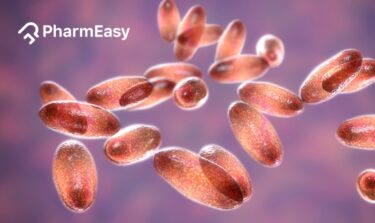

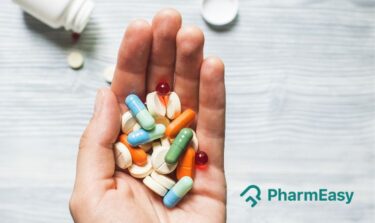
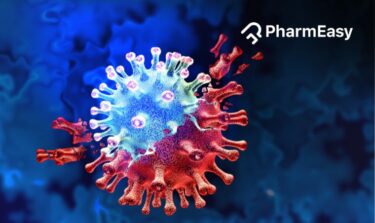
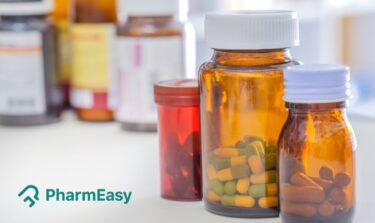
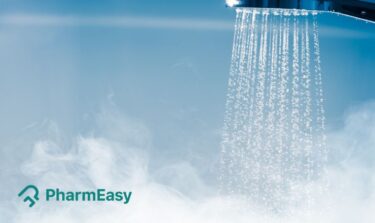
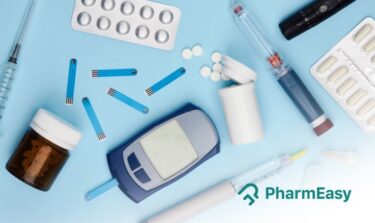
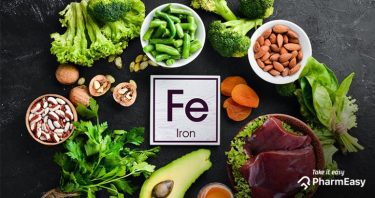





Comments